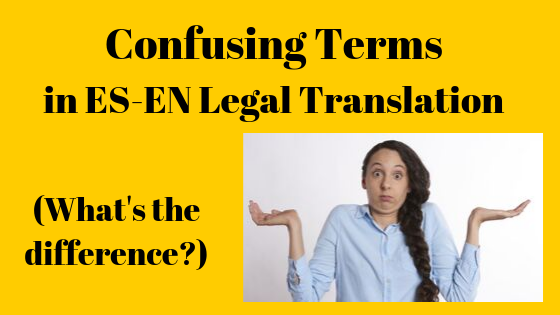Many confusing terms in legal Spanish and legal English are simply legal synonyms that are not always clearly distinguishable, often making it necessary to learn how each one is used in a specific context or in set phrases (frases hechas). Some may be interchangeable; others are limited to use in specific contexts. Those highlighted in this blog are ones that I have seen confused in translation or that my students and lawyer clients have found most difficult to distinguish.
inviolabilidad; inmunidad; aforamiento
In the context of parliamentary practice, these terms are often confused because all three denote types of parliamentary privileges (prerrogativas parlamentarias). Inviolabilidad and inmunidad are both types of parliamentary immunity, but refer to two very different privileges enjoyed by Spanish senadores and diputados. Inviolabilidad refers to “immunity (or) non-liability for opinions expressed in the exercise of their duties” (inviolabilidad por las opiniones manifestadas en el ejercicio de sus funciones). In contrast, inmunidad refers to “criminal immunity” or “immunity from arrest and prosecution.” In that regard, members of parliament may only be arrested if apprehended in the actual course of committing a crime (sólo podrán ser detenidos en caso de flagrante delicto), and they cannot be subjected to a criminal investigation or prosecuted without the prior authorization of their respective chambers of parliament (no podrán ser inculpados ni procesados sin la previa autorización de la Cámara respectiva). In that event, a suplicatorio, i.e., an application to lift a member of parliament’s immunity (levantar la inmunidad) must be submitted to the Congreso de Diputados or Senado, and may be granted or denied (being referred to as concesión o denegación del suplicatorio).
To add to yesterday’s blog entry, in this context, aforamiento refers to the fact that, if members of parliament are prosecuted they have the privilege of being tried by the criminal division of the Supreme Court (Sala Segunda del Tribunal Supremo), rather than by a lower criminal trial court. In that regard, members of autonomous community parliaments would be tried by the Superior Court of Justice (Tribunal Superior de Justicia) of their respective community. In effect, aforamiento (or the fact of being aforado) implies being subject to a different forum (fuero) or venue than would be ordinary citizens. Thus, here aforamiento may perhaps be rendered as “jurisdictional privilege,” while aforados are “persons (in this case, members of parliament) who enjoy jurisdictional privilege.”
